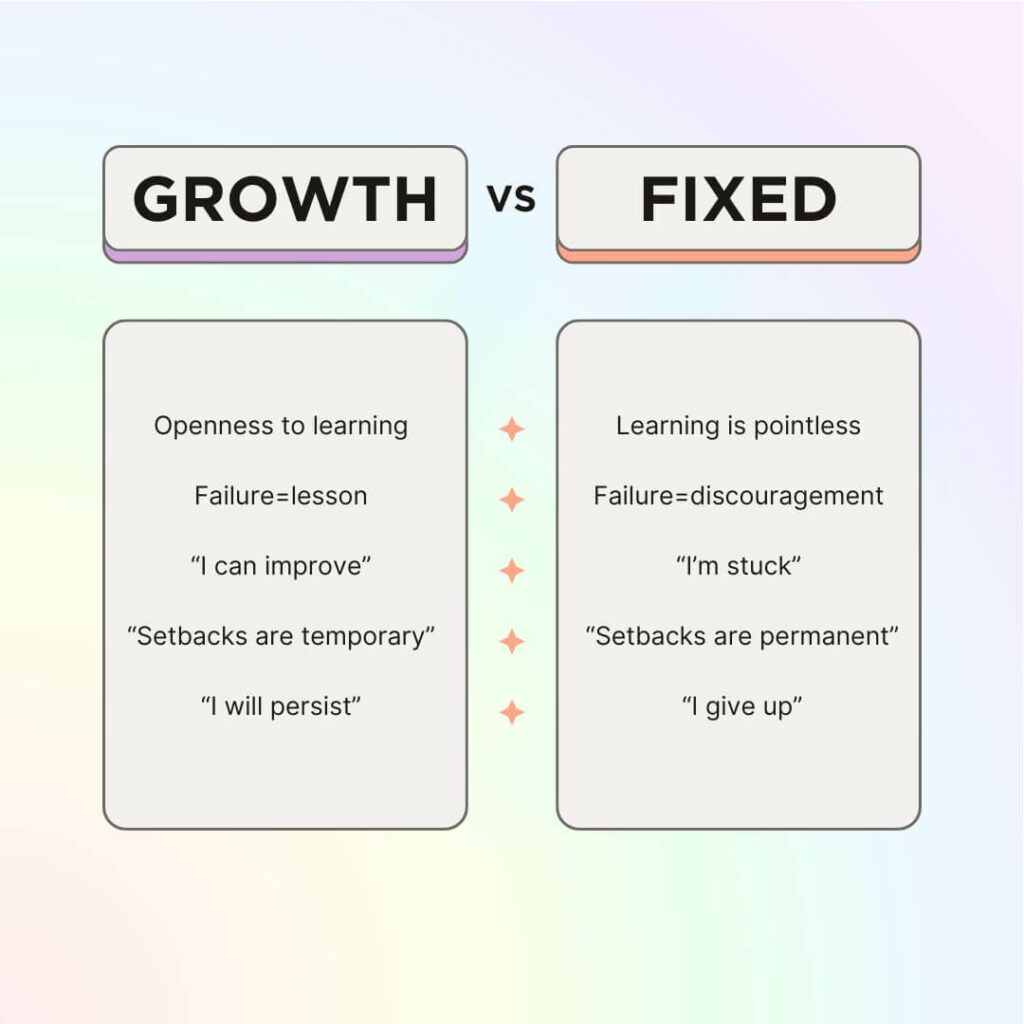Growth Mindset for Happiness: What is a Growth Mindset and Fixed Mindset
Imagine the difference between seeing challenges as barriers versus viewing them as opportunities to learn. This contrast lies at the heart of the growth mindset for happiness—a way of thinking that embraces growth, adaptability, and resilience. The concept of “growth mindset” has transformed how we approach personal development, well-being, and success. A growth mindset doesn’t just impact performance in school or work; it has a lasting effect on mental health and life satisfaction.
This article dives into what a growth mindset and fixed mindset are, what differentiates them, and why adopting a growth mindset can enhance well-being, resilience, and happiness. Whether you’re curious about the impact of mindset on your life or are ready to begin developing a growth mindset for happiness and success, this journey is full of actionable insights and tips.

What is a Growth Mindset and Fixed Mindset?
First, let’s answer a foundational question: What is a growth mindset and fixed mindset? A growth mindset is the belief that intelligence, talents, and abilities are not fixed—they can be cultivated and developed over time. People with a growth mindset understand that, through effort and persistence, they can improve and achieve more. Challenges are seen as opportunities, failures as lessons, and feedback as a guide to improvement.
On the other hand, a fixed mindset is a belief that abilities and intelligence are static and cannot be significantly changed. Individuals with a fixed mindset often view challenges as threats to their self-worth. When setbacks occur, they may be discouraged, thinking that their limitations are fixed. Fixed mindset thinkers may avoid risks and give up more easily when faced with obstacles.
Understanding what is the difference between fixed mindset and growth mindset sheds light on why one leads to growth and satisfaction while the other can hold people back.
What is the Difference Between Fixed Mindset and Growth Mindset?
What is the difference between fixed mindset and growth mindset? The answer lies in how each mindset views potential, effort, and challenges. The difference between fixed and growth mindset can impact not only how we see our abilities but also how we approach life’s challenges and setbacks.
In a fixed mindset, individuals believe that abilities are innate; you’re either “born with it” or not. This perspective leads people to avoid challenges that might reveal any limitations and may feel anxious about receiving criticism. For them, failure feels personal, a confirmation of what they believe they lack.
With a growth mindset, however, effort is seen as the path to mastery, and challenges are embraced as ways to improve. Those with a growth mindset aren’t afraid of failure; they see it as a natural part of learning. The difference between a fixed mindset and growth mindset thus shapes how people approach life, determining if they shrink from challenges or face them head-on.

Fixed Mindset and Growth Mindset Examples
You now know what is a growth mindset and fixed mindset. However, to illustrate the growth mindset for happiness more clearly, here are some fixed mindset and growth mindset examples in everyday situations:
- Learning New Skills
- Fixed Mindset: “I’m just not good at math. I’ll never understand it, so why bother trying?”
- Growth Mindset: “Math is challenging, but with practice and time, I can improve.”
- Facing Feedback
- Fixed Mindset: “This criticism means I’m just not good at this.”
- Growth Mindset: “This feedback helps me see where I can improve. I’ll use it to get better.”
- Handling Setbacks
- Fixed Mindset: “This failure proves I’m not cut out for this.”
- Growth Mindset: “I learned something valuable from this failure. I’ll try again with this new perspective.”
These growth mindset examples highlight that a growth mindset doesn’t deny challenges; it faces them with resilience and adaptability. When we adopt this approach, we unlock the benefits of growth mindset in various aspects of life.

Benefits of Growth Mindset: How It Enhances Happiness and Success
The benefits of growth mindset go far beyond academic or professional success. Developing a growth mindset has transformative effects on happiness and mental well-being, fostering resilience, optimism, and adaptability. Here’s how a growth mindset boosts both success and personal fulfillment:
- Greater Resilience
By viewing challenges as learning opportunities, those with a growth mindset are better equipped to bounce back from setbacks. This resilience is key to enduring life’s ups and downs with a sense of purpose and determination. - Increased Motivation
A growth mindset fuels intrinsic motivation. When we believe our efforts matter, we’re more likely to set and pursue meaningful goals. As motivation directly impacts achievement, you need a growth mindset for success. - Improved Mental Health
Embracing a growth mindset reduces stress and anxiety related to performance. When we see effort and improvement as the path forward, we let go of perfectionism and self-doubt. This change is one major reason why the impact of growth mindset on mental health is so positive. - Stronger Relationships
The growth mindset extends to our interactions with others. By valuing growth over judgment, we approach others with empathy and open-mindedness, which strengthens our social bonds. - Happiness from Progress
As we experience personal growth, we feel a greater sense of fulfillment and happiness. This sense of progress reinforces the growth mindset for happiness, connecting our mindset with an ongoing sense of joy and well-being.

Ways to Practice Growth Mindset in Daily Life
So, how to develop a growth mindset in life? Here are some ways to practice growth mindset every day:
- Embrace Challenges
Instead of avoiding difficult tasks, dive into them. Accept that they’re part of growth and view each challenge as an opportunity to learn. - Reframe Failures
Practice viewing failures as stepping stones rather than roadblocks. Reflect on what went wrong, identify the lessons learned, and apply them to future efforts. - Celebrate Effort Over Results
Focus on the effort and progress you’ve made, not just the end result. Recognize that the journey is where growth happens, and celebrate each step along the way. - Adopt “Yet” Language
When you catch yourself thinking, “I’m not good at this,” add “yet.” This small shift reinforces the idea that improvement is possible. - Seek Constructive Feedback
View feedback as a gift rather than criticism. Actively seek feedback from others to gain new insights into areas where you can grow. - Surround Yourself with Growth-Minded People
The people around us influence our mindset. Connect with individuals who inspire growth, learning, and self-improvement.
Practicing these strategies makes the growth mindset for happiness and success part of your life, enhancing well-being and resilience along the way.
Growth Mindset and Success: Achieving Goals with the Right Mindset
The link between a growth mindset and success is undeniable. With a growth mindset, we understand that achieving goals requires effort, persistence, and a willingness to adapt. Unlike a fixed mindset that sees success as a product of inherent ability, a growth mindset views it as the outcome of consistent work and learning.
When we set goals with a growth mindset, we’re more likely to follow through, even when faced with obstacles. This mindset encourages us to break down challenges into manageable steps and to celebrate progress along the way. The belief that we can grow and improve makes success not just achievable but also more satisfying.

The Impact of Growth Mindset on Mental Health and Happiness
The impact of growth mindset on mental health is profound. People with a growth mindset are more resilient, optimistic, and equipped to handle life’s ups and downs. This positive outlook creates a buffer against stress and anxiety, contributing to overall happiness.
The growth mindset and happiness link also stems from the way we perceive self-worth. In a fixed mindset, self-worth is tied to success and failure. But with a growth mindset, our self-worth isn’t about achieving perfection—it’s about learning, adapting, and growing. This approach fosters self-acceptance and reduces feelings of inadequacy.
By embracing a growth mindset, we empower ourselves to face challenges with optimism and resilience, paving the way for greater happiness and mental well-being.
Developing a Growth Mindset for a Happier Life
If you’re looking to adopt a growth mindset for happiness, consider incorporating the strategies listed above into your life.
Moreover, it’s essential to understand that a fixed mindset is rooted in a misconception. Adopting a growth mindset is crucial because research demonstrates that change and growth are indeed possible. Take, for instance, billionaire Richard Branson, founder of the Virgin brand. Despite facing various learning challenges in school, he went on to become one of the most influential figures in global business. Similarly, Albert Einstein was once told by a teacher that he would never accomplish anything due to a lack of intelligence—yet he became one of the most renowned scientists in history. These stories, among countless others, illustrate how individuals can achieve remarkable success by embracing change and perseverance.
If you need additional support cultivating a growth mindset, you can book a call at 4HappyU.com. At 4HappyU, we offer coaching and positive psychology programs to help individuals foster growth, resilience, and well-being. Whether you want to enhance personal happiness, build stronger relationships, or achieve professional success, a growth mindset can make a lasting difference.

A Story Illustrating the Growth Mindset: Thomas Edison and His Mother
One widely shared story about the inventor Thomas Edison beautifully illustrates the principles of a growth mindset. The story goes like this:
One day Thomas Edison came home and gave a paper to his mother. He told her, “My teacher gave me this paper and told me to only give it to my mother.” His mother’s eyes were tearful as she read the letter out loud to her child, “Your son is a genius. This school is too small for him and doesn’t have enough good teachers to teach him. Please teach him yourself.”
Many years after Edison’s mother had died, Edison became one of the greatest inventors of the century. One day he was going through the old closet and he found a folded letter that was given to him by his teacher for his mother. He opened it. The message written in the letter was, “Your son is mentally ill. We cannot let him attend our school anymore. He is expelled.”
Edison became emotional reading it and then he wrote in his diary, “Thomas Alva Edison was a mentally ill child whose mother turned him into the genius of the century.”
Whether or not this story is factual, it serves as a powerful example of the growth mindset. It highlights how belief in one’s potential, combined with encouragement, can foster resilience, perseverance, and success. A growth mindset doesn’t deny challenges but reframes them as opportunities for growth, just as Edison’s mother may have done in this story.

Final Thoughts on Growth Mindset for Happiness
Adopting a growth mindset is more than a strategy for success; it’s a pathway to a fulfilling and resilient life. When we believe in our ability to grow and embrace challenges, we open doors to endless possibilities in happiness, mental well-being, and personal achievement. The growth mindset for happiness encourages us to see life as a journey of learning and adaptation, where setbacks are opportunities and effort is the key to mastery.
Whether inspired by real-life figures like Edison or through our own experiences, we can nurture a growth mindset by celebrating progress, embracing failure, and continually striving to improve. This mindset empowers us to live each day with optimism and purpose, cultivating resilience and joy along the way. By choosing growth, we don’t just seek success; we find meaning, fulfillment, and happiness.
Resources
The information in this article is grounded in scientific research. If you’re interested in specific studies, feel free to reach out to us.
For daily doses of joy, positivity, inspiration, and motivation, be sure to follow us on Instagram at 4HappyU.
Za naše bralce v Sloveniji
Če vas zanima več o psihoterapiji in iskanju trajne sreče, preberite naslednje članke: Psihoterapija Obala, 5 ključev do trajne sreče in notranjega miru, Najboljši psihoterapevti v Sloveniji: Kako se hitro spopasti s stresom, Psiholog v Kopru: Kako odpraviti težave s psihoterapijo in RTT terapijo, in Psihoterapija Online: Prednosti in učinkovitost terapije na daljavo.


